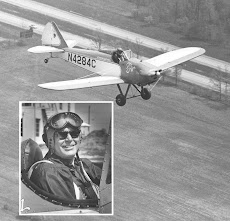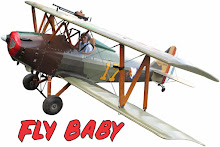Today was a beautiful day in central Virginia, blue sky and gentile breeze, right down the runway. Well it was until I was starting to take off and the wind switched to straight across the runway with gust to 14 knots. All much beyond my abilities. Spring is coming we'll have more nice days soon, and the plane is still in one piece when they come.
Tuesday, February 9, 2021
Thursday, February 4, 2021
Flew Almost 1 Hour On A Nice February Afternoon
I finally got to tryout the changes I made to the cowl skirt and the position of the cylinder cooling pressure drop probes. I think I may have cut off too much of the skirt. The cylinder head temperature seems to have gone back up about 3 degrees. The oil temperature quickly stabilized at 170 degrees so I'm not overheating the motor.
The shortened cowl skirt allowed good airflow to the venturi, mounted under the fuselage, so the Turn and Bank indicator finally works. I can make nice coordinated 1 needle width turns.
The cabin heat works well enough that I was able to fly without gloves, which was nice.
I'm still going around the airport. I think next time I'm leaving the security of the airport. It was nice to be able to fly open cockpit on a day when we still had some snow on the ground.The airport is on my left by the spreader bar. we have lots of trees in Virginia.
I'm now on the crosswind, heading southeast.
Saturday, January 2, 2021
New Ladder For Refueling - Flew For 1/2 Hour
Everything cooperated today and I got to fly for a half hour on a warm sunny afternoon. The motor ran fine, about 20 degrees cooler, not what I had hoped but better. My next plan is to start trimming the outlet skirt shorter in 1/2" increments. Take off 1/2", fly it and repeat as needed until it's as cool as I would like or starts getting hotter. My theory is that it's so long we're getting flow curling off it and blocking flow out. We'll see.
I also got to try out the new ladder my son Wade and his wife Melanie got me for Christmas. Now I can see in the filler neck so I don't overfill it so easily. It's the right height, has a good hand hold, and has wheels for easy moving around, cool. All fueled up ready for the next nice day.Monday, December 28, 2020
Idle Mixture Problem Solved
I did some reading of the Stromberg NA-S3 manual and on-line. Bob Kachergius, "The Stromberg Specialist", has a good article on how to adjust the idle mixture. There is a needle valve with an adjustment screw on the back of the carburetor.
Rather than have a mechanical accelerator pump, this carburetor has 2 Idle Discharge Nozzles. One nozzle is above the Throttle Valve, when the valve is closed at idle. As long as the valve is closed it provides all the fuel needed to keep the motor running.
Thursday, December 24, 2020
Ignition Problem Solved - Now I Seem To Have A Carburetor Problem
Replacing the coil in the right magneto and carefully re-timing both mags. seems to have solved my ignition problem. I ran the motor and taxied around the airport for a few minutes. At 1700 RPM I have a 100 RPM drop on the left mag. and less than that on the right. Everything seems to be back to the way it was before all this.
Well not quite everything, now the motor hesitates and sputters when you try to accelerate from below 1000 RPM.
If it had an automobile carburetor I would say the accelerator pump is bad. Opening the throttle allows more air through the carburetor. At the same time that causes a slight increase in pressure in the throat of the carburetor, of if you like, less vacuum. This means there is less pressure differential to push the fuel from the float bowl into the throat. Both changes, more air and less fuel, mean a leaner mixture, which, depending on the mixture just before the throttle is moved, can cause the motor to misfire or lack the power to accelerate. On an automotive carburetor they solve this with a little accelerator pump which squirts just a bit more fuel into the throat to richen the mixture. It works, in my '63 Corvette you could slam your foot to the floor and the car would still accelerate without hesitation, while smoking the tires and slamming you in the seat.
On airplanes we generally avoid jamming the throttle open quickly. Also, no one wants the motor to sputter when you're trying to recover from a bad landing and need full throttle, now.
It's possible I've got a small air leak between the carburetor and the cylinders or some dirt in the carburetor after setting 26 years. I won't know until I get things apart. I've ordered a carburetor kit from Fresno Air Parts. It's coming by 2 day Priority Mail which means it should be here in the next 2 weeks, oh well. It's already 2 days and the tracking just says it's In-Transit. I'll get back on it after Christmas.
Merry Christmas!
Friday, December 11, 2020
Ignition Problem Still Not Solved
I removed the magneto, cleaned the contact points and cleaned up some grease that was slung out of the bearings I had repacked. I really didn't find anything wrong. I found some slight wear on the cam which operates the points. I ordered a new cam and waited, and waited. It finally arrived yesterday, 8 days late, Oh well.
I reassembled the magneto with the new cam and reinstalled the magneto. As the sun set I was able to get the motor running, but there is no improvement at all.
since this magneto does not have an impulse coupling I may be able to fix up a spare and see if it solves the problem. Hopefully tomorrow I can remove the mag and work on one of the spares I have. We'll see what happens.
Monday, November 23, 2020
The Motor Has An Ignition Misfire Around 1,000 RPM
I went out yesterday to go flying, got to the end of the runway to do my run-up check and found a noticeable misfire around 1,000 rpm. It wasn't noticeable at idle nor at 1,700 rpm for the magneto check. Obviously I decided not to go flying.
Today I went back out with my infrared thermometer. My plan was to run the motor to determine which magneto was missing by running the motor at 1,000 rpm then switch mags to see if there was a noticeable difference. The motor started fine and there is a pronounced misfire when running on the right magneto. The left magneto seems fine. The right magneto was the one I had problems with earlier in the year.
I kept it running on the right magneto until the cylinder head temperature reached about 200 degrees F. Then I shut the motor down and quickly opened each cowl access panel. Using the infrared thermometer I checked temperature of each cylinder. The expectation was that if the problem were a misfiring plug that cylinder would be cooler than the good cylinders. No such luck. The 2 front cylinders were about 20 degrees cooler then the 2 rear The front and rear cylinders were almost the same left and right. Clearly not a single misfiring spark plug.
I went ahead and pulled the spark plugs for the right magneto, the easy ones on top of the cylinders. The first thing was a visual inspection to see if they looked different. The color was the same normal tan color. Next I used a 10x glass and checked the plugs for any lead fowling. None was visible and since they are new plugs they really looked good.
The last thing I did was to very carefully check the electrode gap and make minor adjusts to assure each electrode was precisely between 0.015" - 0.018".
The plugs were reinstalled and torqued. The motor was restarted. The problem is still the same. Clearly something has changed in the magneto. Before pulling it I wanted to re-read the service manual to see if checking timing, etc. might give some insight as to what to look for in the magneto. I also need to look up what parts I've already replaced.
Hopefully tomorrow I'll get back out, do any checks, and remove the magneto. we'll see what I learn once it's off














